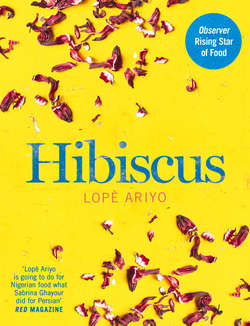Читать книгу Hibiscus: Discover Fresh Flavours from West Africa with the Observer Rising Star of Food 2017 - Lope Ariyo - Страница 7
ОглавлениеINTRODUCTION
My experiences from childhood, school and university have shaped the way I cook and my food has become an expression of who I am. Born and raised in London, I have very early memories of taking trips to Brixton or Croydon market with my mother, Debbie, on Saturdays. We would always visit the vegetable stalls first, followed by the meat and fish stalls where I would do my best to hold my breath for as long as I could. The market was always so congested that I stayed glued to my mother for fear that I would get lost. When we got back home, I would help out in the kitchen as she prepared something like tomato stew or okra soup. I can vividly recall my mother blending and frying the tomatoes, finely chopping the okra and pounding ground rice in hot water with a wooden spoon. The splashes of tomato juice would trickle down the tiles as the stew boiled aggressively, the stove would sizzle as some of the okra soup escaped the pot and, to the delight of my nose, the smell of caramelized chicken crept slowly from the oven. Her approach to cooking has always been to create dishes that are quick and easy. This weekend ritual provided my first experiences of Nigerian cooking.
My mother raised me to be hardworking, honest and independent, and she also thought it was important for me to learn about my Nigerian roots and to connect with my extended family and culture. So in 2003, I went to an all-girls boarding school in Lagos, Nigeria. Initially it was daunting, but as I made friends and got into the routine, I became more open to the Lagos way of life. I came back to London for secondary school, bringing with me a strong sense of culture, solid friendships and an enriched appreciation of Nigerian food. I started cooking more and more, alternating between British and Nigerian meals to keep my cravings for the aromatic flavours to which I’d become accustomed at bay. I would mimic the dishes of beans and plantains or yam and spicy tomato stew that we were served at boarding school – simple dishes that were perfect for weekdays.
I met my closest friends in the sixth form and during our free periods, we would go to the shop to buy sandwiches, Scotch eggs, sausage rolls, cakes and elderflower and blackcurrant cordials to have mini picnics. Since not one of us had the same ethnic background, we’d always bring a dish that represented our own cultural history, too. We taught each other about ingredients and introduced each other to new flavours, and I discovered how joyful it was to invite them over and cook for them. This was one of the things I missed most when I first went to university. When I rang home, my mother would usually ask ‘Have you eaten?’ or ‘Are you hungry?’, as is the norm with most West African parents when their children are sad or moody. I found solace from homesickness in the kitchen and soon my housemates, who knew little about Nigerian culture, came to rely on me for ingredient and spice suggestions. We ended up cooking meals together, whether British, Nigerian or a mix of both cuisines. I realized that in the kitchen I was able to create a home away from home, no matter where I was.
For me, British and Nigerian influences are equally important – I like to merge the best aspects of both. I love the combinations of ingredients (especially the spices) used in Nigeria and West Africa, whereas British or European cooking tends to offer more time-effective methods. I am passionate about West African food because it promotes the use of fresh, natural ingredients and the emphasis is on taking care of your body without overthinking things. Our food is all about caring and hospitality – bringing people closer together and making people feel happy. Behind each dish, there is a story to share.
Globalization and multiculturalism are doing much to promote West African food and culture in the UK. However, there aren’t many high-profile figures who champion West African food in this country, so I want to share my culture and inspire other British Africans to tell their stories through food. I think representation matters, so if someone can see a little bit of themselves in me, I hope they’re encouraged to pursue their own ideas and express themselves through what they cook as I have done. More than ever before, African foods are readily available in supermarkets and online. Despite this, they’re not bought as much as they might be because there’s little understanding of how to use these ingredients. I’ve witnessed people trying West African food and I’ve seen the intrigue it sparks on their taste buds – they want to know about the flavours and how to make it. There are a growing number of cafés and restaurants serving West African food, but recreating these dishes at home is still out of reach for many.
Hibiscus is my first cookbook and I hope to show you a glimpse of what West African-inspired food has to offer. From over 200 of the ethnic groups in Nigeria, I’ve primarily focused on the cuisine of three: Yoruba, Igbo and Hausa. My aim is to create fresh, flavourful meals for every occasion. There are ingredients that you may never have come across (although I’ll always try to provide an alternative where possible) and new cooking methods and techniques to try, too. You’ll also find British classics with a Nigerian twist and rejuvenated recipes for everyday staples that make use of underappreciated flavour combinations. I hope these recipes can transform your cooking into something spectacular, the way they have mine.
